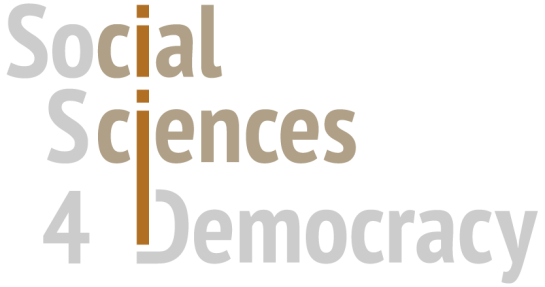
Acronym: SOS4democracy
Title: Social Sciences for democracy: a training program for improving research on illiberal systems and finding ways to build more robust democracies.
Call: HORIZON-WIDERA-2022-TALENTS-03
EU nr: 101119678
Period: 48 months/4yrs; 1/9/2023-31/8/2027
Budget : total: €2,714,232.50; VUB: 334,375.00 €
Contact: Dr. Lior Volinz
At ERIS we got the chance to interview Lior Volinz and asked him 2 questions.
What is SOS4democracy about ?
Lior: “Today -despite the persistent presence of illiberal politics in South-Eastern Europe- there is a limited research capacity to address these issues within these countries. The main reasons for the limited research on illiberal trends in South-Eastern Europe are various lacks in support. These lacks are a lack of institutional support for developing new interdisciplinary research programs, the lack of support for intersectoral cooperation to include the non-academic sector in research, and the lack of training programs to better equip staff members. Moreover, there is currently no institutional support for developing monitoring mechanisms -the non-academic sector can provide- for preventing democratic slip back.
In order to fill these gaps, the SOS4democracy (Social Sciences for Democracy) project is designed to tap the potential of higher-education and research organizations, civil society associations, and a news media organization to create an effective training program to better equip researchers, journalists, and activists involved in pro-democracy struggles.
We focus on the central issue of how to improve the training of staff members to enhance research on the current democratic regressing. First, all staff members will acquire new research and other skills, which will improve their career prospects and options for new collaborations. Staff members from the academic sector will acquire new research skills (e.g., advanced research methods) and practical skills (e.g., skills for conducting civic monitoring, skills for public advocacy, and media skills). Staff members from the non-academic sector will acquire new research skills (e.g., theoretical knowledge, new methodologies) and practical skills for conducting research (e.g., research management skills, data management skills,…)”.
Why is SOS4democracy important to VUB?
Lior: “The main aim for for VUB lies in the Transfer of Knowledge on policing and surveillance: we have developed an extensive expertise at the Crime & Society research group on surveillance and its societal consequences, as well as on the digitalisation and modernization of urban policing. We believe we can use our expertise to provide training on the conceptual tools needed for understanding how political elites label certain groups as ‘dangerous or internal enemies.’ Thus, in order to understand how the introduction of expansive surveillance and policing interventions are presented as solutions to ‘security issues’ that must urgently be dealt with, including by using emergency measures.
The training program will provide mentoring on how such labelling, often justified by invoking national security, paves the ways for the introduction of measures that violate the human rights and freedoms of the “dangerous” groups. As recent socio-legal studies showed, illiberal systems aim to suppress critical individuals and organizations by using methods such as censorship, resource deprivation, slander, legal actions, threats of legal actions, and astroturfing.
On top of that, under the leadership of the Crime & Society research group of VUB, the project partners will develop a new Knowledge Center on (digital) surveillance and the challenges it poses to democratic rule of law. The Knowledge Center will provide an inventory of existing surveillance technologies and practices employed by authorities, and a database of relevant literature and legislation (national and European). This information will be made available digitally in a format of “accessible” scientific writings, briefing reports, and notes to the professional field (e.g., practitioners, social movements, and civil society organizations)”.
ABSTRACT
The turn to illiberalism, often combined with anti-European rhetoric, represents a serious threat to the European Union.
With most of the research focused on Poland and Hungary, the emergence of illiberal trends in other countries, including Slovenia, Bosnia and Herzegovina, Turkey, and Italy, has often been neglected. To fill this gap, the SOS4democracy project aims to create an alliance of research and higher-education institutions, civil society associations, and a private news media organization to develop effective training programs for enhancing research on the recent turn to authoritarian systems in South-Eastern Europe.
AIM &METHODOLOGY
In line with the working program, the project will pursue three major objectives. Firstly, the project will strengthen cooperation and improve research and innovation ecosystems in academic and non-academic organizations by developing a training-through-research program to equip researchers, journalists, and civil society activists with the conceptual and methodological tools needed to explore the impact of illiberal measures in the participating countries.
Secondly, to ensure the transfer of know-how between the academic and non-academic sectors, the project will develop the following training programs: the academic sector will provide training on advanced research methods and practical skills, the news media organization will provide media training, while non-governmental organizations will provide training on civic monitoring mechanisms, public advocacy, and the use of new technology in civil society organizing. The extensive transfer of know how will be carried out through secondments, in-person networking events, and webinars.
IMPACT
Thirdly, to improve the overall R&I (research & innovation) capacity of all participating organizations, the project will organize a training program on research management, knowledge brokering, data stewardship, and knowledge transfer
